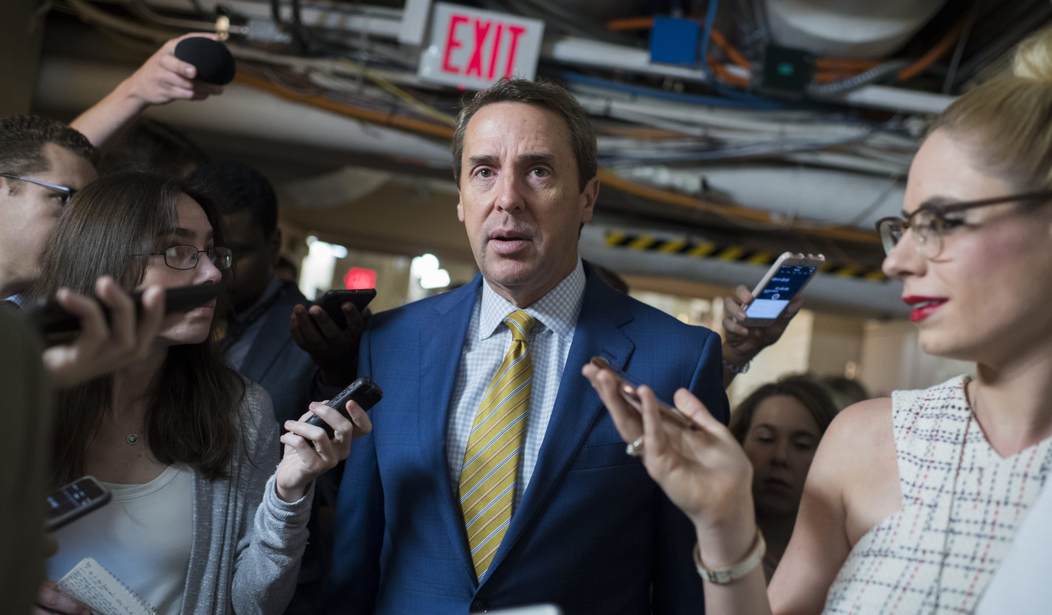WASHINGTON – Rep. Mark Walker (R-N.C.), the chairman of the conservative Republican Study Committee, urged the Senate to start voting on the “504 bills they have” from the House, especially the legislation dealing with sanctuary cities.
Last year, the House passed Kate’s Law and the No Sanctuary for Criminals Act, which are both pending in the Senate.
U.S. District Judge Michael Baylson of the Eastern District of Pennsylvania recently ruled that the city of Philadelphia is still able to receive federal grants despite its “sanctuary city” policies that prohibit full cooperation with Immigration and Customs Enforcement (ICE). Philadelphia Mayor Jim Kenney was seen on video dancing after the ruling.
Walker shared his reaction to the court ruling.
“Operating under Article I, our legislative powers allow us to be able to cut off funding to the sanctuary cities so we’re going to continue to look for legislative ways to be able to do that,” Walker told PJM after his speech at a Faith and Freedom Coalition town hall on Capitol Hill, organized as part of the group’s “Road to Majority” conference.
“We know the vast majority of the American people think that a sanctuary city is preposterous, that you could literally allow people to have safe harbor, people who have even broken the law, without fear of prosecution or arrest, even outstanding warrants – that’s not how we do things in this country,” he added.
Senate Majority Leader Mitch McConnell (R-Ky.) announced the cancellation of the Senate’s August recess. Walker said lawmakers have ample time to vote on many pieces of legislation sent over from the House.
“I think the Senate should act on all 504 bills they have from us, but that’s one they specifically should pull out and get some things moving. Hopefully with them cancelling their August recess, it will give them some more time, not only to get to work on the nominees but also to get some of the 500 bills that are sitting over here that the House has passed,” Walker said.
“We’ll work here as long as we need to but the House, just like last year, we passed all 12 appropriations bills, we’ve passed our stuff, OK, Senate, it’s your turn….We’re waiting for the Senate to try to catch up with us. We can stick around here and maybe we can come by and cheer them on or buy them some coffee and doughnuts or whatever we might have to do to encourage them, but we feel like we’ve done our part,” he added. “So if they need us to stick around to do what we can to ‘rah-rah,’ we’re happy to do that but it’s time for them to do their job.”
Senate Majority Whip John Cornyn (R-Texas) said the Senate should vote on the sanctuary city bills.
“I would be happy to see them passed,” Cornyn said, noting that an immigration reform proposal with an anti-sanctuary city amendment failed in the Senate earlier this year. “This remains unfinished business and we really need to get that done.”
Cornyn told PJM that the GOP-led Congress has to be “fairly surgical” in how to deal with sanctuary cities.
“In other words, you can cut off some money but not all money, for example, law enforcement and other purposes,” he said. “So there is a way to get this done and to do it in a legal way that would be upheld by the courts, and that’s certainly going to be our goal.”
Reacting to Baylson’s ruling, Rep. Cathy McMorris Rodgers (R-Wash.) told PJM, “I have supported legislation that would make clear that we would withhold funding for cities that are not abiding by federal law or cooperating with federal agencies. We need the Senate to act.”
Senate Judiciary Committee Chairman Chuck Grassley (R-Iowa) said recently that sanctuary cities are “wrong because the Constitution is pretty clear, one of the 18 powers of Congress is immigration so we ought to have maximum cooperation on the enforcement of federal law.”
Grassley told PJM the federal government has the power to cut off grants it sends to cities.
“Sure we can, because there’s plenty of Supreme Court rulings that say Congress can put any stipulation any money we give out,” he said.









Join the conversation as a VIP Member